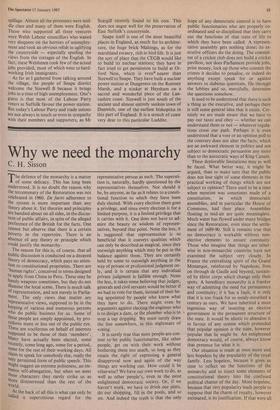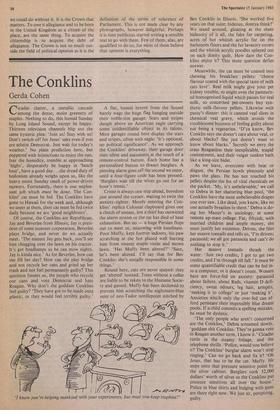Why we need the monarchy
C. H. Sisson The defence of the monarchy is a matter of some delicacy. This has long been understood. It is no doubt the reason why the tercentenary of the Restoration was not celebrated in 1960. De facto adherence to the system is more important than any theory about it. Yet theories and principles are bandied about on all sides, in the discus- sion of public affairs, in spite of the alleged preference of the British for the facts. One cannot but observe that there is a certain Poverty in the repertoire. There is an absence of any theory or principle which could justify the monarchy.
The reason for this is, of course, that all Public discussion is conducted on a decayed theory of democracy, which pays no atten- tion to constitutional proprieties. There are `human rights', conceived in terms designed to apply from China to Peru. These may be handy weapons sometimes, but they do not illumine the local scene. There is much talk of representation, and not merely in Parlia- ment. The only views that matter are representative views, supposed to be in the keeping of various and numerous persons Who do public business for us. Some 'of these people are simply appointed, by pro- cedures more or less out of the public eye. These are vociferous on behalf of interests supposed to be those of their 'members'. Many have actually been elected, some recently, some long ago, some for a period, some for the rest of their working days. All claim to speak for somebody else, really the Only permitted form of public speech. This might suggest an extreme politeness, an im- mense self-abnegation, but when we meet these characters they rarely strike us as more disinterested than the rest of the World.
At the back of all this is what can only be called a superstitious regard for the representative person as such. The supersti- tion is, naturally, hardly questioned by the representatives themselves. Nor should it be, by anyone, as far as it relates to a consti- tional function to which they have been duly elected. With every election there goes a privilege, and since every election is for a limited purpose, it is a limited privilege that it carries with it. One does not have to ad- mire the beauty or wisdom of represen- tatives, beyond that point. None the less, it is suggested that representation is so beneficial that it conveys qualities which can only be described as magical, since they outweigh anything which may be put in the balance against them. They are certainly held by some to outweigh anything in the way of private or professional judgment on- ly, and it is certain that any individual private judgment is fallible enough. None the less, it takes some believing that judges, generals and civil servants would be better if we had to vote for them, instead of their be- ing appointed by people who know what they have to do. There might even be arguments against electing the engineer who is to design a dam, or the plumber who is to stop a tap dripping. We must surely draw the line somewhere, in this nightmare of voting.
It is surely true that most people.are con- tent toilet public functionaries, like other people, get on with their work without bothering them too much, so long as they retain the right of expressing a general disapproval now and again of the way things are working out. How could it be otherwise? We have our own work to do, as well as other people's, even in the most enlightened democratic society. Or, if we haven't work, we have to drink our pints, do our shopping, fill in the pools, and so on. And indeed the truth is that the only hope of any democratic control is to have public functionaries who are properly co- ordinated and so disciplined that they carry out the functions of that state of life to which they have been called. A represen- tative assembly gets nothing done; its ex- ecutive officers do the doing. The commit- tee of a cricket club does not build a cricket pavilion, nor does Parliament provide jobs, print money, lock up those who commit the crimes it decides to penalise, or indeed do anything except speak for or against answers to dubious questions, file through the lobbies and so, mercifully, determine the questions somehow.
It used to be understood that there is such a thing as the executive, and perhaps there is still some general idea that it exists. Cer- tainly we are made aware that we have to pay our taxes and obey — whether we can understand them or not — whatever regula- tions cross our path. Perhaps it is even understood that a vote or an opinion poll to the contrary does not alter the facts, which are an awkward element in politics and not subject to democratic persuasion any more than to the autocratic ways of King Canute.
These deplorable limitations may as well be faced. What better way, it might be argued, than to make sure that the public does not lose sight of some elements in the practical working of things which are not subject to opinion? There used to be a time when mention was sometimes made of a constitution, in which democratic assemblies, and in particular the House of Commons, had their place. Assemblies floating in mid-air are quite meaningless. Much water has flowed under many bridges since the Restoration, even since the settle- ment of 1689-90. Still it remains true that no democracy is workable without non- elective elements to ensure continuity. Those who imagine that things are other- wise in non-monarchic countries have not examined the subject very closely. In France the centralising spirit of the Grand Monarque, reinforced by Napoleon, lives on through de Gaulle and beyond, sustain- ed by elitist corps which change only their spots. A hereditary monarchy is a franker way of admitting the need for permanence and continuity; if it has a fault, it is Only that it is too frank for so mealy-mouthed a century as ours. We have inherited a most ingenious way of inserting an elective government in the permanent structure of the state. It would be idiotic to abandon it in favour of any system which pretended that popular opinion is the state, however popular that lie might be. An enlightened democracy would, of course, always know that pretence for what it is.
Our situation is made at once more and less hopeless by the popularity of the royal family. Less hopeless, because it gives us time to reflect on the functions of the monarchy and to inject some elements of constitutional theory into the confused political chatter of the day. More hopeless, because that very popularity leads people to suppose that the charm of royalty, however estimated, is its justification. If that were all we could do without it. It is the Crown that matters. To owe it allegiance and to be born in the United Kingdom as a citizen of the place, are the same thing. To acquire the citizenship is to acquire the debt of allegiance. The Crown is not so much out- side the field of political opinion as it is the
definition of the terms of reference of Parliament. This is not made clear by any photographs, however delightful. Perhaps it is time publicists started writing a sensible text to go with them. Few of them, alas, are qualified to do so, for most of them believe that opinion is everything.







































 Previous page
Previous page